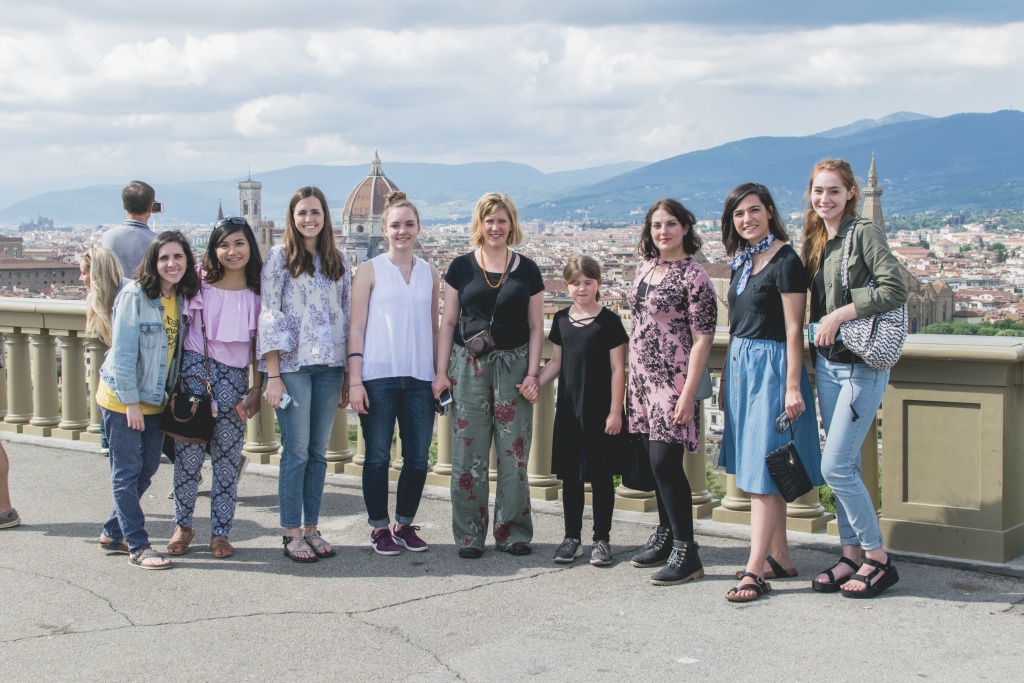My husband and I are pretty passionate about study abroad programs for a number of reasons. We know they are valuable. We’ve seen how they’ve changed our students. We remember how they changed us.
It’s too easy to see students posting photos of beautiful places and desirable experiences and to think that they are on an expensive vacation, but I believe that it’s a unique learning experience that reaps benefits for a lifetime. I believe taking students to new cities unlike anything they’ve ever experienced is Kingdom work, even if they aren’t assisting missionaries or holding camps. Here are several reasons.
Students learn to travel internationally.
A huge part of taking students abroad is helping them become comfortable with international travel. Many of our students have never been to Europe, have never traveled internationally alone, or both. Learning how to secure a passport, book plane tickets, navigate customs and public transportation, and move through a foreign culture is a real-world skill. It’s great to learn that now so that if God calls them to travel, move or work abroad, they already understand how to get there. We don’t know what our futures hold, but we want to be ready to say “yes” when it’s time.
Students go outside their comfort zones.
We also want the students to experience discomfort. Hopefully not discomfort we have created, but leaving our own backyards puts us squarely outside our comfort zones. It challenges us, makes us trust God, builds tenacity, requires resourcefulness, makes us empathetic with the displaced, the stranger.
Being limited in luggage is good for you. You don’t need all that stuff.
Students experience new cultures.
Travel opens our hearts to new cultures, to people who do some things differently than we do, who may believe differently than we do, but who are more like us than they are different from us. Travel can cultivate humility in us as our presuppositions about other cultures are challenged.
Students grow in relationships.
Traveling with others, living in close quarters, experiencing the discoveries and discomforts of travel with others—all of these force students to hone their interpersonal skills, to learn self-denial, and to forge deeper friendships.
Students gain a new perspective on history.
Seeing buildings that are older than our country gives context to just how old some of these civilizations are. You don’t study history or art or culture in the same way ever again. Ever. My daughter regularly mentions the sights we have seen. She makes connections to books she’s reading, stories she’s hearing, people she’s meeting. And she’s only 8. I remember realizing that the things I saw in books actually existed. And they didn’t look exactly as I had imagined. Twenty-first-century life was bustling all around these ancient structures.
Students need to see what happens when whole cities collaborate on a creative project. Sometimes these collaborations took generations. These people had a determination that produced some of the highest achievements in architecture. These architects were sometimes scorned, dismissed or opposed. But they had a vision. They persevered. They prevailed. They didn’t give up. They didn’t procrastinate until the night before the plans were due. They didn’t give up when things got tough.
Students experience beauty—and its destruction.
Students need to see mind-blowing beauty. Not just for fun. They need to remember that God’s original plan for humans was to be cultivators. They need to see examples of human flourishing—even if it is marred—so they can imagine how they might contribute to human flourishing where they are called.
They need to see the way that humans flock to cities to see beauty, moth to flame. In a world that seemingly values efficiency, people are traveling at great cost and trouble to centers of beauty because the God who is beauty created us to respond to beauty, even if it is imperfect.
Students need to see the destruction that obliterates beauty, the result of wars and hate and apathy. They need to see the importance of stewarding the cultural gifts around them, that bring joy, that tell stories, the long view of how we care for those things that people have given their lives for.
Travel, when focused towards good goals, is invaluable. It’s a huge sacrifice for most of us, but it can become the seed that brings forth great fruit, eternal fruit.
This past summer Michelle and Paul Radford took a group of students to Barcelona, Naples, Rome, Florence, Cannes and Palma Majorca. They walked through history as they toured museums, churches and ancient cities. They were inspired by some of the finest examples of art and architecture in the western world. The Radfords anticipate repeating this Study Abroad course to the Western Mediterranean in May of 2020. You can view more photos of the 2018 trip here.








